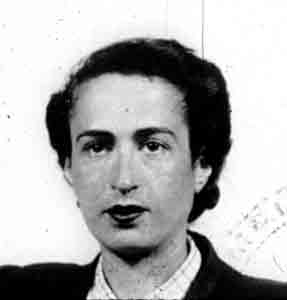
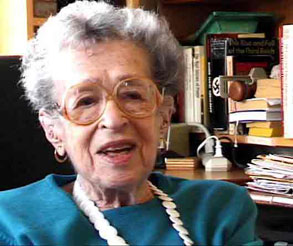
In 1941 French document
During production in 1999 of upcoming
documentary And Crown Thy Good
[Varian Fry Institute Home] [Chambon Foundation Home]
 |
|
|
In 1941 French document |
During production in 1999 of upcoming |
the indomitable Lisa Fittko
1909-2005
Obituary in
New York Times, March 21, 2005
Lisa Fittko, Who Helped Rescue Many
Who Fled the Nazis, Dies at 95
Remembering Lisa Fittko, Holocaust rescue hero by Rafael Medoff, Chicago Jewish News, April 1, 2005
Niece Catherine Stodolsky's biographical information on her aunt
Excerpts from interview of
Lisa Fittko
for upcoming documentary And Crown Thy Good
|
|
“[In fall 1940,] we went to downtown Marseille and we met people, friends from all over, and we tried to find out what was going on. What was going on was that everybody was trying to get out of the country and everybody was chasing papers.
I remember my husband saying, 'This is hopeless. We don’t have anything. How should we get any papers?’
But then they kept telling us there are ways. There’s an office, I forget the street, right in the middle of Marseille, where for a hundred francs, which was nothing, you can get a Chinese visa. And so we said, ‘What do we do with a Chinese visa?’ ‘It doesn’t matter. You can go somewhere. You have a visa!’
Within a few hours, half of Marseille knew already and when we got there, there were long lines standing in the street. But we went in. We did have two hundred francs and we got visas. Much later, somebody was translating the stamp which they put in there, to us, which said that the bearer of the certificate can never and under no circumstances ever enter Chinese territory. But of course in Marseille nobody knew Chinese and we didn’t and it didn’t really matter: it was a Chinese visa.”
*****
“The way to get out of France is general was to cross the Pyrenees, the mountain range between France and Spain. There were some other ways that were tried and some worked. Of course, Marseille was the port and there were some boats but it was very restricted. But the main road was over the Pyrenees. It wasn’t too difficult because this was where the Pyrenees go into the Mediterranean, so it wasn’t very high. People kept going there not knowing the road, not knowing anybody, being arrested, being pushed back. What bothered us is that it wasn’t organized."
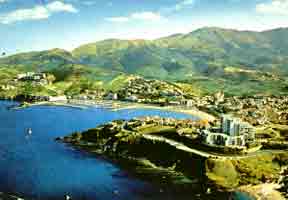
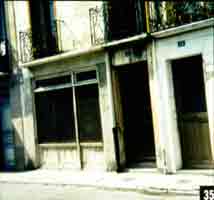
At left, the bay and village of Banyuls-sur-Mer in a postcard from the early '80s. Per Lisa Fittko, the crossing point into Spain, through the foothills, was farther to the right, not in this photograph. Except for the few modern modern buildings, the village had remained unchanged. Socialist Mayor Azéma was a great help to the Fittkos. On right, a later photograph of the balcony of the Fittko home in Banyuls in 1940-41, above what was then a police station..
"When I was at the border, my husband in Marseille said that there’s this American and he wants to talk to us.
The next evening we met with Fry, with and through a friend of ours who was already working for Fry, who is now Prof. Hirschman. We met him, this being the first time we met him. I was a little nervous that he didn’t look right. The way he looked he didn’t fit into that little French bistro. As for as I remember, he had a business suit and he looked very proper. He was real proper. And in the Vieux Port you didn’t find proper people.
We had a conversation with him and he said, ‘Í have so many people who have to get across the border.’ And I said, ‘Yes, you have to somehow organize this, somebody has to be there who is coordinating it.’ And he said, ‘Well, that’s why I wanted to talk to you.’ He wanted to ask us, my husband and me, would we go to the border. He understood that we had previous experience in border crossing. And would we go there.
That wasn’t an easy decision, and we said we ourselves had to leave . We were very hesitant and my husband said, ‘I don’t thing that we can do that.’ And all of a sudden I heard Fry say, ‘How much?’ in English. My husband said, ‘What do you mean?’ We didn’t speak much English but we knew what ‘How much?’ means. It became clear that he understood that we were bargaining for being paid. And the border of course was full of people who allegedly helped people crossing and who did it for a tremendous amount of money.
And my husband got terribly angry and told him so. He said, ‘Do you think we’re crazy to risk our lives at the border for money?’ He said something like, ‘Do you know what anti-fascists are? Do you know what we’re about?’ Hirschman got in between and said, ‘Wait a minute, it’s a misunderstanding and he didn’t mean to offend you.’ And somehow we made it clear to him that money was not what made us hesitate and we said we’d think it over.
Somehow we came to a decision that we’ll go for a short time. But as it
turns out we stayed about six months. And took people over, mostly people that
Fry sent us. How many? We didn’t count. It never occurred to us that this
would be history and that somebody would come to
Most of the people who came, until they were here didn’t really know what they were getting into. Fry or the committee had sent them to the border, ‘We’ll get you over the border, we have people there.’ And then they saw the mountains.
They sometimes sent us people they shouldn’t have sent, who weren’t that young and some were not well. And I’ll never forget one woman they sent us, and she had an illness, whatever it’s called, a nervous illness. And she was going one step forward and two back. And how do you get somebody across the mountains when she goes two steps back for one in front. It was terribly difficult.
It was with a group. And everybody was helping here but she became difficult. She wanted an apple. ‘Why didn’t we have an apple for her?’"
*****
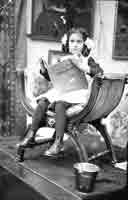
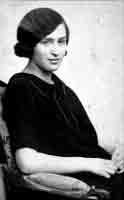
Lisa Ekstein (Fittko) at age 6 in Vienna in 1916, and at 15 in Berlin in 1925
|
|
“There were a lot of committees in Marseille. It was full of committees, Jewish or Protestant or what not, to help the refugees who were all crowding the city. To me, the greatest merit of Fry was the he very soon understood that under these circumstances and this regime you cannot help people if you do not risk illegal things. And he did it.
What Fry accomplished—and it’s a lot—is all the more admirable because he was totally innocent, totally inexperienced of course. He couldn’t help everybody, there were thousands. He just couldn’t. He learned very fast.
It was not only famous people. He also helped political people, if they were not
connected to the Communist party. What do you do with hundreds of thousands of
people? How do you do it? How do you try to save as many without choosing and
how do you choose them?”
*****

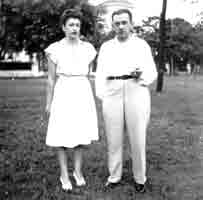
Lisa and Hans Fittko, in Cassis, France, summer 1941, and
in Havana, Cuba,
after the war, before they arrived in the U.S. in 1948.
“My brother had somehow unearthed the honorary consul of Panama in Marseille who was able to give visas for Panama. Meaning that he could write them, he could stamp them, he could sign them, all that. But they were not valid, Panama did not want us. This was a Frenchman, I have to say a real Marseille Frenchman.
And he was an aficionado of salami. And it so happened
that my brother had also discovered a delicatessen store which had a lot of
different salamis. Which was very rare in Marseille at that time. I don’t
know why that store had all the salami left. The story was that if you
wanted to have a Panama visa, which would enable you to get a Spanish
transit visa and a Portuguese transit visa, pretending you would go to
Panama, he would do it if you would give him a
We had a long discussion about the quality of the salami and what it had to come from—certainly not beef. He would never dream of giving a visa for salami that’s made of beef. He gave us visas.
Fry had a confrontation with my brother. My brother and Fry talked about the Panamanian consul. And Fry was very angry. He said, ‘This is my connection. I found that. It’s always the same: there are gossips and the rumors and then it’s taken away. And here there are important people who are terribly endangered and I can’t do anything because somebody will always discover the connection and take it away from me.’ And the fact was, I think, that my brother not only told us but his best friends.
I had a discussion about it with Fry too, although it wasn’t directly about the fact that we now had Panamanian visas.
|
|
I said to him, ‘But look at the situation. People are running for their lives. Just thing about what you would do if you had a very close friend or a relative or your parents or whoever is close to you, and you know a way how to get out of the trap, you wouldn’t tell him? Just because somebody else says that it’s their connection? It’s impossible. I understand what you’re saying and it’s very unfortunate if things cannot be done by you because some other people are grabbing it, but that’s not your fault, it’s not my brother’s fault. It’s the situation that created that way.
People will try to save themselves and there are some people who will also try to save others.’
He said, ‘I understand what you’re saying but what do I do?’"
*****
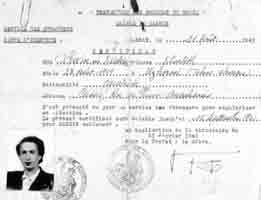
Fraudulent Lisa Fittko identification card issued by the town hall of Cassis to protect the refugees, per Lisa Fittko: "The paper certifies that the bearer 'has appeared at the Service for Aliens to regularize his or her situation.' The town administration of Cassis was not authorized to issue papers in the name of the Prefecture; there was no 'Service des Etrangers' (Service for Aliens). The mayor could not sign 'for the Prefect.' Even though the document had no real meaning, it repeatedly saved us from being arrested."
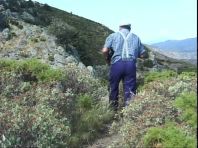
For the upcoming documentary And Crown Thy Good, filmmaker
Pierre Sauvage found and filmed the Fittko escape route.
[Varian Fry Institute] [Chambon Foundation Home]
[email us] [contact information] [table of contents] [make a contribution?] [search] [feedback] [guest book] [link to us?]
© Copyright 2006, Chambon Foundation. All rights reserved. Revised: June 25, 2006